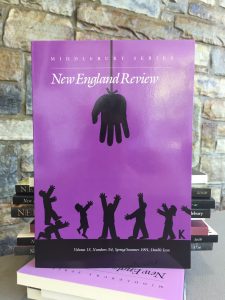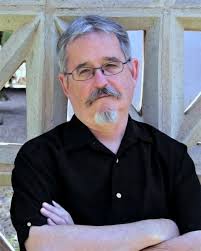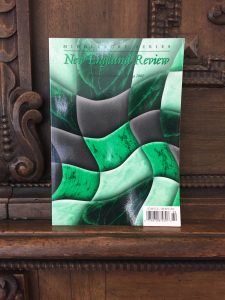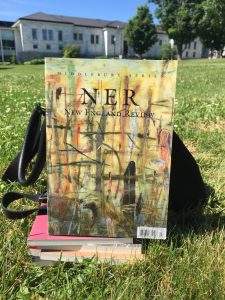
Former Office Manager Lexa de Courval considers the persistent questions and mysteries found in “Beautiful Dreamer,” an essay by Carl Phillips, from NER 35.2 (2014).
“Beautiful Dreamer” demands your attention in the very first paragraph. I admire how Carl Phillips chooses here to write about what is difficult and also very real, and in doing so he creates images we will respond to differently—we might feel uncomfortable, or charmed, perhaps even angry. Regardless, I find myself contemplating the Blue King, and mesmerized by the beauty of his descriptions.
Of the many treasured pieces we published during my years at NER, I am still drawn to this work because I feel that it is courageous, and it came to me at a time when I was questioning the world around me on a deeper level. Our lives are filled with experiences that require us to rely on our instincts while sorting through truth and myth. Recently I have reflected on what it means to be human today, and how social media has created another layer to living behind a mask. We are not always how we envision ourselves, and at times are warriors within our own lives trying to heal and find our inner beauty. Asking probing questions and taking risks can be like being on a battlefield, particularly with the unsettling challenges in our current world.
For decades I have adored poetry, spending hours rereading intriguing lines to ask myself: Have I missed the point? How do I know this isn’t my selfish interpretation of something I need to happen in this work? Phillips comforts me in this as he writes about his own poem “Beautiful Dreamer,” and in response to poetry.
For months after having written the poem, I in fact found it difficult to know with any certainty, if not the poem’s meaning, then at least the meaning to which the poem might be gesturing. Many poets write toward a chosen subject, but I’ve always been the kind who writes from a supposedly clear space into a space of surprise, that is, where I find myself surprised—and not so pleasantly surprised, more often than not, surprised instead into a heightened awareness of something troubling.
We are often troubled by the page and how real it can be; we know what our hearts feel, yet we sometimes question our innate being. Poetry can take us down a dark alley, but we are compelled to know what we will find there. Is it real or is it a dream? Are we hiding behind a disguise of what we imagine? This essay will challenge you to face your dreams and desires.
Was it Dante’s Inferno or The Iliad of Homer that first brought forth the expression to eat one’s heart out, which appears here in Stephen Crane’s rather bestial stanza of a creature eating his own heart? Is it power we seek when we punish or are punished—to claim one’s glory and revel in someone else’s doom?
I enjoyed Phillips’s selections from Shelley and Crane reflecting on power, and on how for some, punishment can often become as addictive as pleasure. “We can never really know another’s heart,” he writes. But if it is our own heart, we are compassionate, and “it’s better to eat of what we know.” He quotes from Crane’s Black Rider series:
“But I like it
Because it is bitter
And because it is my heart.”
Phillips brilliantly describes how a poem is an “interior dialogue we have with our other selves,” how we “write in response to being human.” “The poem is a form of negotiation with what haunts us,” he writes, “. . . insofar as what haunts us is, in part, who we are.”
I was the Blue King. I led the dance.
One might have chosen to skirt the encounter in the park with which Phillips opens this essay, yet he chose to look it in the eye and be mystified, and to attempt to clarify for himself what he really saw. Phillips challenges us to seek understanding in the world around us and be surprised. He continues with the subject of loss in “Untitled,” a poem by Lorine Niedecker. We feel emotion for the subject that is difficult to put into words—Paul / when the leaves fall. Is there beauty in mourning? We do not want to live our lives alone, but sometimes to be human is to feel very alone as we face death and hardships.
Phillips invites us into the work of these other writers, and into their stories, as he brings them into his own exquisite writing. Writers are compelled to record these times, and we relive each day through the histories of others as we create our own moving pictures. What is real and what is a dream, history or imagined, heroic or heartbreaking? Phillips encourages us to write, to seek meaning and confront the challenges in our everyday lives.
Having worked at NER and Bread Loaf for many years I have been continually inspired by authors like Carl Phillips and by their presence in my own life. I remember seeing John Ashbery, whose passages Phillips describes in his final page, surrounded by young scholars in a crowded room. I remember reading Seamus Heaney from a hefty Norton Anthology in college and then what an honor it was to meet him in person and receive his poem, “Du Bellay in Rome” for NER’s 34.2. I cherish the sound of Julia Alvarez lecturing on little children saving the world through medicine. People and place are life and these surroundings make up who we are and how we live.
Phillips leaves us with provocative questions: Are we living, dreaming, or haunted by the moment? What is beauty and how do we make peace with our own inner demons? Admittedly, I cannot know Shelley’s “Ozymandias” or the Blue King of “Beautiful Dreamer,” though I can come to know them through Phillips. While pondering these alluring pages ahead, I hope you will keep dreaming and be enchanted. And, are we not most beautiful while we sleep?
“Beautiful Dreamer” by Carl Phillips
**
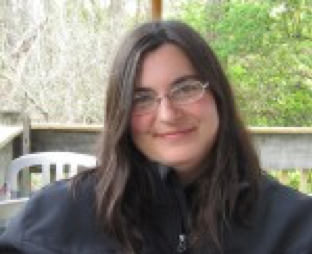 Lexa de Courval was Editorial Assistant and then Office Manager at New England Review from 2009 to 2016. She is currently the Academic Coordinator at the Rohatyn Center for Global Affairs at Middlebury College. She previously worked in local museum education programs at both Shelburne Museum and Henry Sheldon Museum, and for the Bread Loaf School of English.
Lexa de Courval was Editorial Assistant and then Office Manager at New England Review from 2009 to 2016. She is currently the Academic Coordinator at the Rohatyn Center for Global Affairs at Middlebury College. She previously worked in local museum education programs at both Shelburne Museum and Henry Sheldon Museum, and for the Bread Loaf School of English.
